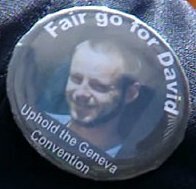Wednesday, April 21, 2004. 12:49pm (AEST) 
Australian inmates Mamdouh Habib and David Hicks will ask the US Supreme Court today to decide whether Guantanamo Bay falls within the jurisdiction of the US legal system.
If the court agrees, lawyers for the Australians as well as two British detainees will seek to have their detention declared unlawful.
The Law Council of Australia is hopeful the US Supreme Court will allow the inmates to have their cases heard in civil courts.
Law Council president Bob Gotterson says the case could set an important precedent.
"The fact that the US Supreme Court is looking at that case suggests that it at least thinks that time has come to look again at the whole of the law in relation to jurisdictions of US courts and offshore territories," he said.
US lawyer Joseph Margulies represents Mr Hicks and Mr Habib as well as two Britons and says the US cannot continue holding the inmates without due process.
"I'm very gratified by the obvious care the Supreme Court has taken in this case, as was reflected in their questions," he said.
"The US cannot hold people without some process."
The US Supreme Court has already examined the legality of the indefinite detention of about 600 prisoners at the Guantanamo military base in Cuba, who are considered enemy combatants in the US "war on terrorism".
The court will decide by June whether the Guantanamo detainees - accused members of the Taliban and Al Qaeda, many held more than two years without charge or access to an attorney - have the right to contest their detention in a US court.
Mr Hicks's military-appointed lawyer, Major Michael Mori, says the court case is a key to him receiving a fair trial.
"I'm not afraid to take on the government in a fair and established justice system," he said.
"Give me a US court martial, give us a civilian trial and we'll take them on... and I'm confident we'll prevail.
"The problem is the commission process they set up is totally unfair and has no basic fundamental protections to ensure the credibility of a verdict."
Mr Hicks's Adelaide-based lawyer Stephen Kenny says even if the court hands down a favorable decision, his client would not be freed immediately.
"The court is only looking at whether or not they have jursidiction in Guantanamo Bay. If they decide the US Federal Court have jurisdiction then the matter will be referred back to a lower court to determine the legality of the case. So it may take some years before that is finally resolved," he said.
Debate
In an intense hour-long debate solicitor general Theodore Olson, speaking for the US Government, insisted US law could not be applied to the inmates, who come from about 40 countries, as Guantanamo is not on US soil.
The base is on land leased from Cuba under a 1903 treaty, which Cuba says it no longer recognises.
"It's totally artificial to say that because of a provision in the lease, the executive branch can create a no-law zone and not be accountable," argued John Gibbons, lead attorney for the prisoners, most of whom were detained in Afghanistan.
"What's at stake is the authority of federal courts to uphold the rule of law," Mr Gibbons said.
"If one detainee assaulted another, he would be prosecuted under US law, because no other law is provided there, it's not Cuban law."
Mr Olson was on several occasions interrupted by the Supreme Court justices.
The government attorney, whose wife Barbara was killed in the September 11, 2001 terror strikes on the United States, began his remarks saying: "The US is at war".
Judge John Stevens quickly interjected: "The existence of war is not relevant. Your position does not depend on the existence of war".
Judge Stephen Breyer said "the executive being free to do whatever they want, that's the first problem," and others pressed Mr Olsen repeatedly for clarification.
Many civil rights groups say the detainees are in a legal black hole.
But the administration argues its main objective is to prevent people it considers agents of international terrorism returning to action against the United States.
About 20 demonstrators protested outside the high court including Amnesty International and the pacifist coalition Answer.
The US may face unprecedented action at the UN's human rights commission this week for allegedly abusing the rights of Al Qaeda and Taliban suspects detained at Guantanamo.
-- Reuters
|